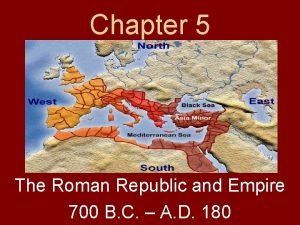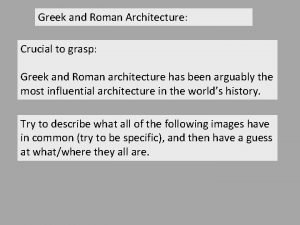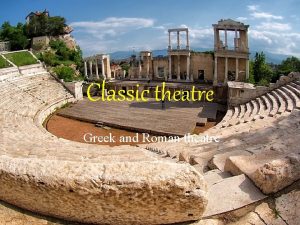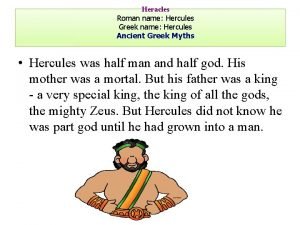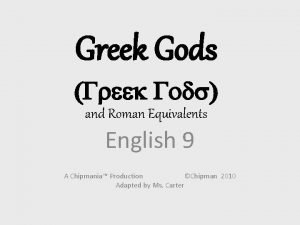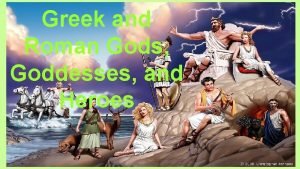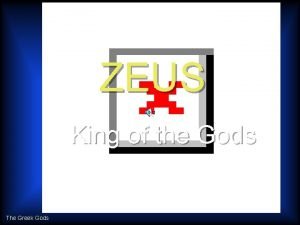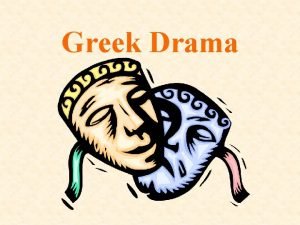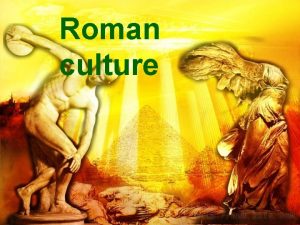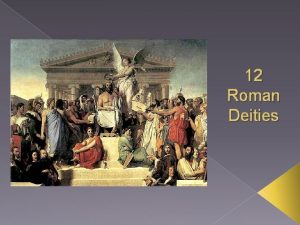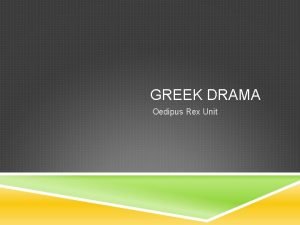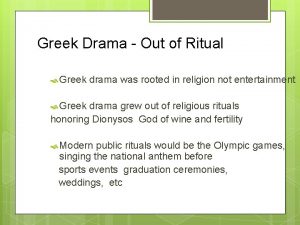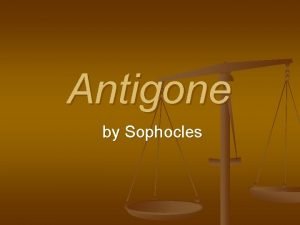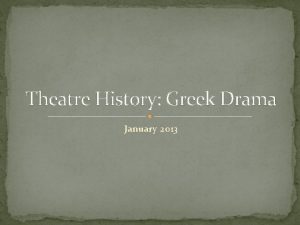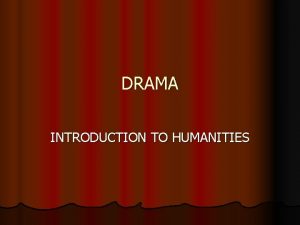Greek Roman Drama Introduction to Greek Drama Greek


















- Slides: 18

Greek & Roman Drama

Introduction to Greek Drama • Greek contribution to world • Intellectual/expand the mind • Greatest accomplishment of the 5 th century • Duty of Greek citizen to attend (rich or poor) • Supported by state/Pericles • Drama part of Festival of Dionysus – 1 st round: comedies – 2 nd round: tragedies

Aristotle’s Poetics • Treatise: significant writing • Concept of tragedy: when a great person meets disaster as a result of choices or flawed character • Hubris: worst character flaw • Catharsis: an outpouring of emotion according to Aristotle: a purifying of emotions that is brought about in the audience of a tragic drama • Three Unities: – Time: All events within prescribed time – Place: Setting doesn’t change – Action: Moves forward (no flashbacks)

Parts of the Theatre Venue • General horse-shoe shape • Orchestra: center circle where performers were • Theatron: where audience sat • Skene: backdrop

Theatre at Delphi



Parts of Greek Drama • Masks – Equipped with a mega-phone type device – Infamous comedy/tragedy masks originated with the Greeks • Music from the Aulos • Dance • Chorus – give overview of the action, comments

Purpose of Greek Drama • Expand the mind • Pursue lofty ideals • Explore ethical issues

Roman Drama • Different from Greek drama • Romans more realistic • Wild, unrestrained, obscene • No abstract ideas • Stock characters: typecast/stereotypical roles

Types of Roman Drama • Farces • Comedies • Pantomime: to convey an idea in gestures; no speech –created by the Romans

Greek & Roman Theater Comparison Greek Roman Intellectual Emotional/obscene, wild Use of masks Pantomime Harm public morals Use of masks Stylized gestures Important to attend

Greek Music • Pythagoras – Mathematician who created a system of intervals in music • Instruments – Lyre (string) used to back up poetry readings – Aulos (wind) used in theatre

Greek Lyre & Aulos

S (ound) H (armony) M (elody) R (hythm) G (rowth)

Roman Music • Instruments: –Hydralus (water organ) –Trumpet & horn (new inventions) • Music used: – Background music at the Colosseum – Social or political tool

Roman Hydralus

Greek & Roman Dance Comparison Greek Roman Ceremonial Entertainment Expressed mystery and power Intentionally sexual
 Bizantine empire map
Bizantine empire map Roman republic vs roman empire
Roman republic vs roman empire Greek and roman geography
Greek and roman geography Greek vs. roman comparison chart
Greek vs. roman comparison chart Optical correction in greek architecture
Optical correction in greek architecture What sports were played in the colosseum
What sports were played in the colosseum Greek and roman art similarities
Greek and roman art similarities Difference between roman and greek theatre
Difference between roman and greek theatre Hercules greek and roman name
Hercules greek and roman name Tartarus family tree
Tartarus family tree Dionysus domain
Dionysus domain Ares realm
Ares realm Muses roman name
Muses roman name Greek gods and roman equivalents
Greek gods and roman equivalents रोमन गिनती
रोमन गिनती Soap serial
Soap serial Eğitici drama ve yaratıcı drama arasındaki fark
Eğitici drama ve yaratıcı drama arasındaki fark What is drama
What is drama Apa pengertian dramoi
Apa pengertian dramoi

